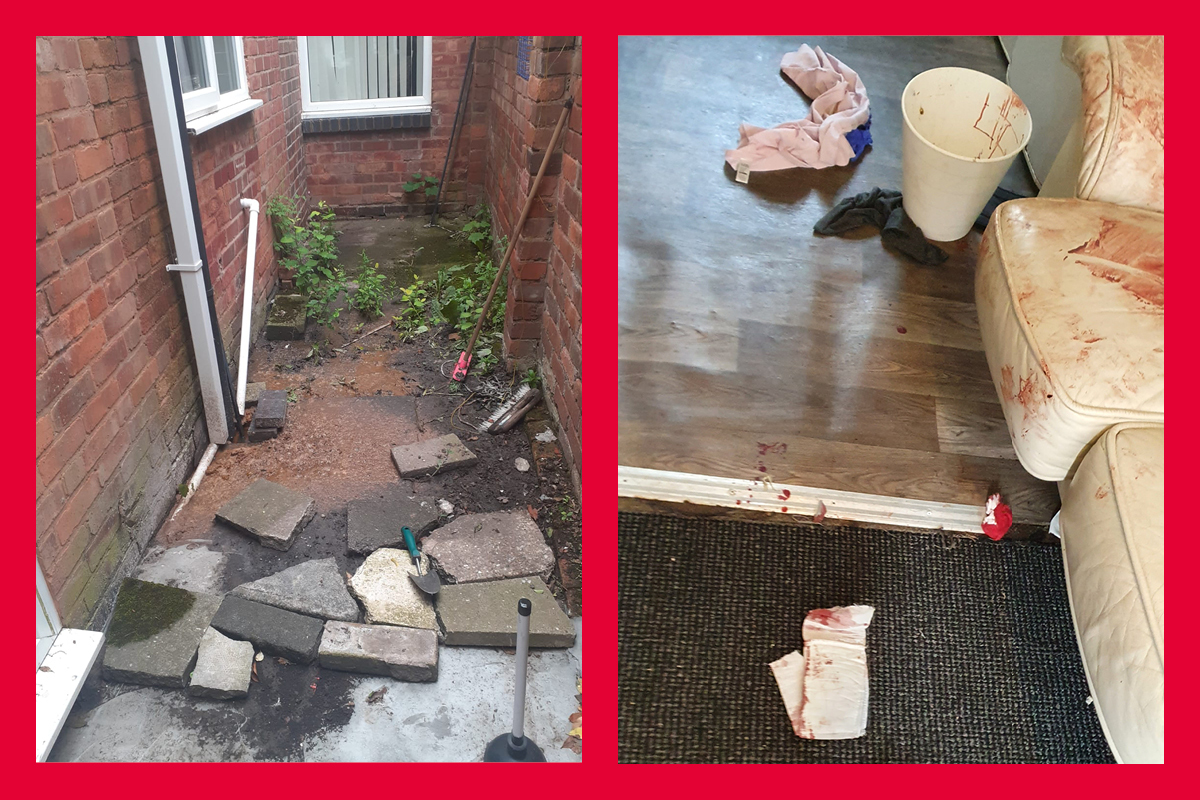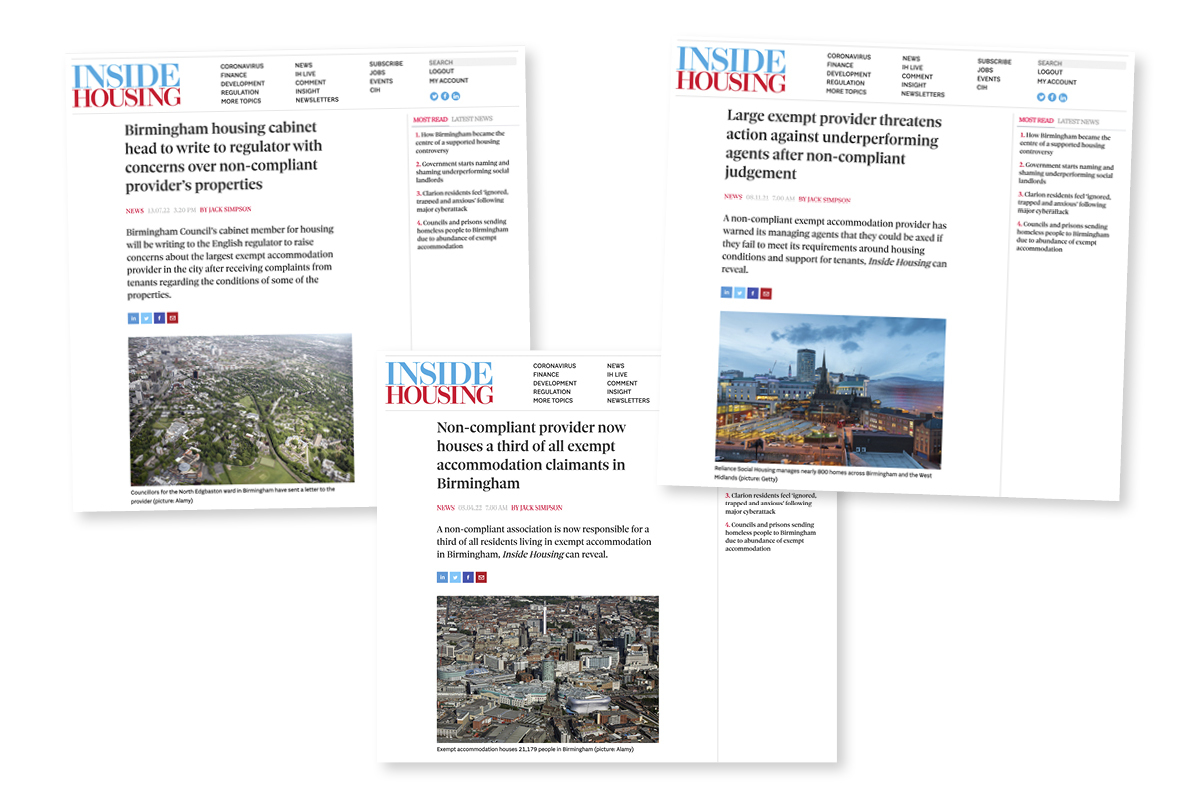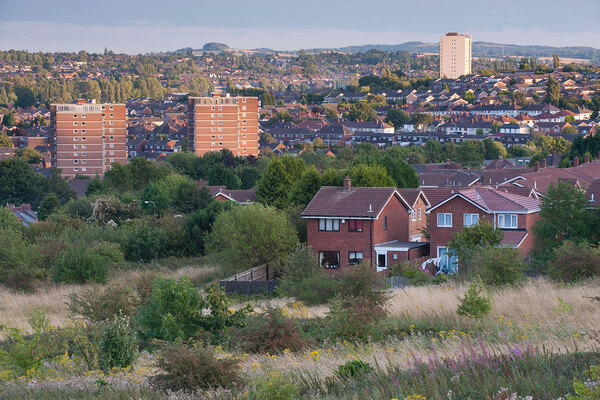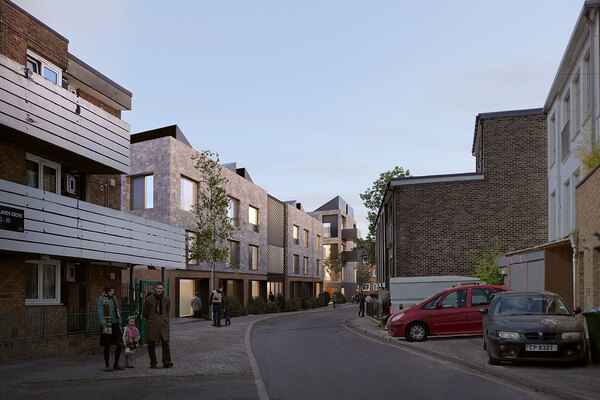You are viewing 1 of your 1 free articles
The Birmingham housing association that went from zero to 8,000 homes in four years
Reliance Social Housing went from a dormant housing association based in Kent to Birmingham’s largest exempt accommodation provider in the space of four years. Jack Simpson investigates the landlord’s rapid rise
If you are an exempt accommodation claimant in Birmingham, there is a one-in-three chance that you will be living in a property managed by the city’s biggest provider, Reliance.
Reliance has become synonymous with exempt accommodation in Birmingham, and it has been a major driving force behind the West Midlands city’s exempt accommodation boom, which has seen numbers double from just over 11,000 in 2018, to more than 21,000 today.
The housing association is now the head registered provider (RP) for more than 8,000 exempt bedspaces across the city, 38% of all exempt accommodation in the city. And with this has seen some significant cash go through the landlord too.
A report by The Independent and Open Democracy revealed that Birmingham City Council had paid an estimated £161m to Reliance through exempt accommodation claims in the past four years.
And while there is no suggestion that the majority of Reliance’s properties have any serious issues, with this rapid growth has come increased scrutiny by the Regulator of Social Housing (RSH), as well as some local politicians: Birmingham’s cabinet member for housing has written to the chief executive of Reliance expressing concerns about the quality of some properties in her area.
But Reliance was not always the exempt behemoth that it is now. Rewind five years, and it was a dormant housing association based 149 miles away in Gravesend, Kent.
So, what happened? How did a Kent-based RP with no homes transform into the biggest provider in the West Midlands’ biggest city, housing thousands of vulnerable tenants?
Inside Housing has dug through the landlord’s Companies House records and spoken to those on the ground in Birmingham to tell the story of Reliance’s rise.
The rise
When the Kent-based company RY Winning Hand registered as a social landlord on 14 October 2013, it would barely have been noted.
It came at a time when it was a lot simpler to register with the RSH than it is today. RY Winning Hand was one of 35 housing associations to register as an RP in 2013. To put into perspective, last year only nine new registrants became RPs.
The first accounts for this new Gravesend-based social landlord were underwhelming: it had assets worth £446. That would barely buy you a door to a social home, never mind a whole property.
In the following years, assets increased – at one point to more than £48,780 – but they never reached any notable levels. RY Winning Hand had become, for all intents and purposes, a dormant RP.
That was until May 2018. After next to no changes on the landlord’s Companies House accounts for nearly four years, a shift began to occur.
On 25 May, the company made a wave of appointments at director level. Throughout May and June, five new directors joined RY Winning Hand. By July 2018, it had lost its Gravesend-based directors and the original owner had given up significant control.
Two days later, the registered office had changed location from Kent to Duddeston, Birmingham.
The person with significant control also changed, with Naveed Ali Minhas now in charge. This would change three months later, with Tanzeel Sabahat becoming the person with significant control on 30 October 2018.
A year later this would change again, this time to Mohammed Sajjid Sarwar, who still has control today.
By the end of August, the name had changed, and RY Winning Hand became Reliance.
This is one of the curious things about the regulated social housing sector. If you want to launch a new RP, you need to go through a registration process and supply a detailed application. This can take up to two years.
However, acquiring or taking over an RP already in existence gives you a quicker route into becoming an affordable housing landlord. It also means you are not required to undergo many of the same checks you would have to go through during the registration process for entrants creating a completely new landlord. In recent years, the acquisition route has been taken by a handful of providers coming into the sector.
Along with the change of name came another change, with Reliance becoming a community interest company (CIC). In the documents supporting this, it set out the organisation’s primary activities. It would now aim to benefit individuals in need of affordable housing, including those who are especially vulnerable and in need of either emergency accommodation or supported housing with assisted living.
Its journey into exempt accommodation had begun.
Exempt accommodation is a type of supported housing that can be provided by housing associations, often through managing agents, charities or CICs. It is offered to people with few other housing options, such as migrants, those fleeing domestic abuse, prison leavers and people experiencing substance misuse issues.
If a provider gives a small element of care, support and supervision, it is ‘exempt’ from usual rules that limit the amount of housing benefit that tenants can claim to Local Housing Allowance rates.
Inside Housing has seen one Reliance tenancy agreement, which has the total eligible rent for one room in shared accommodation set at £215 a week. By means of comparison, the maximum amount of housing benefit that can be awarded for someone living in a shared room in a traditional house of multiple occupancy (HMO) is just over £291 a month.
Now with their new name and new clear aims, Reliance’s management moved quickly to build up its exempt property portfolio. August 2018 saw it purchase its first supported accommodation scheme. By 20 June 2019, it had 2,000 properties under its management in Birmingham.
Some of these properties would have been bought outright, but many would have been secured through lease deals with managing agents and in some cases individual landlords.
Under these deals, Reliance has a network of managing agents with which it has lease and managing agreements. In the main, these managing agents will provide the housing, housing management and support, while paying Reliance a management fee. For exempt accommodation providers this is usually around 10% to 15%.
Reliance’s accounts in June 2019 proclaimed that a blend of skills had allowed it to grow considerably quickly since inception, with the aim to become the best in the sector.
With these skills, and under the lease-based model, Reliance continued to grow. It was one of the biggest contributors to Birmingham’s explosion in exempt accommodation property numbers between 2019 and 2020.
By March 2021, less than three years after its first supported housing purchase, it was managing 5,642 bedspaces across 1,591 properties. This made it the largest provider in the city, with Concept next on the list with 3,773.
There is no doubt that these properties provide important housing for people with few options, and crucial support for those who need it. But because this is such a vital part of the housing sector and the sums involved are so huge, it is important that the services Reliance and others provide are carefully scrutinised.
Inside Housing has asked how it funded these purchases and lease deals to allow it to become so big, but Reliance declined to comment.
There was another significant change during this period. In July 2020, Reliance converted from being a for-profit association to a not-for-profit association.
But had it grown too big, too quickly? The association by that point had nearly 6,000 bedspaces and only 21 staff members, and was operating a model that the regulator had previously questioned when investigating other exempt providers in Birmingham. Would this catch the attention of the English sector’s regulatory body?
In August 2021, the RSH revealed that it was investigating Reliance over matters that may have impacted its compliance with the regulator’s Governance and Financial Viability standards.
Three months later, we got the answer. In October, Reliance was deemed non-compliant with both standards.
It was clear that the regulator had questions about the model Reliance was operating, particularly its use of third-party managing agents.
The RSH stated that it did not have assurances that Reliance had effective and embedded systems in place to ensure that managing agents were providing the services and required levels of support to its tenants in accordance with the agreements in place and the housing benefit claim.
It also suggested in its judgement that Reliance demonstrated a weak contracting environment, and said it did not have assurances that the landlord had effective systems in place to give it sufficient oversight of these payments.
The regulator added that Reliance did not adequately reconcile and monitor the payments made to third parties with evidence that the services were being provided to its tenants – and that as a result, there was a risk that third-party managing agents were not providing the services being claimed, or that services and housing management practices were inappropriate.
At the time Reliance said that it was disappointed with the judgement but that it was determined to protect and expand its “social housing” portfolio and would endeavour to take all necessary steps to satisfy the regulator of any concerns around the “exempt sector”.
The judgement did prompt action from Reliance. The landlord decided to review its managing agents, saying it would take “constructive action” against those that were underperforming and “decommission” those that failed to meet Decent Homes Standard.
Reliance is not alone in being on the receiving end of this type of judgement. The regulator has raised similar concerns about the use of the third-party managing agent model by other exempt accommodation providers in Birmingham.

However, while Reliance was managing more than 7,800 units at the time, in the eyes of the RSH it was still deemed a small housing association.
This is because it has only six units of ‘social housing’ and the exempt properties it controls are not. This means that while the RSH does regulate the governance and financial viability for landlords of this size, they are not subject to the regular in-depth assessments (IDAs) that large associations are, and are also spared from receiving the governance gradings given to larger associations.
This is wholly compliant with legislation as defined by Section 69 of the Housing and Regeneration Act 2008. Birmingham’s other large exempt accommodation providers have similar splits between non-social housing and non-social housing homes: Concept Housing provides more than 5,000 units of accommodation but only 104 general needs social housing properties, and Ash Shahada has more than 3,000 properties but only 200 units for general social needs housing.
It seems this is a gaping hole in social housing regulation. An organisation can be registered as a housing association and manage more than 8,000 properties, but is not subject to regular IDAs because only a handful of these are technically registered as general needs social housing – although the council can inspect conditions in these properties under the Housing Health and Safety Rating System (HHSRS).
Under the Social Housing Regulation Bill, the regulator is set to receive several new powers that will allow it to regularly inspect landlords’ properties and assess them on things such as health and safety and repairs performance.
The regulator will also be able to order emergency repairs if the standard of the home is not up to scratch.
However, under the new laws, this will only apply to general needs social housing. As a result, hundreds of exempt homes may not be subject to this type of regulation.
While there is no basis to suggest that an IDA of Reliance, Concept Housing or Ash Shahada would be negative, or that the regulator would have to use its new powers against any of those landlords, the fact that such a substantial proportion of exempt accommodation can fall outside regulation designed to protect tenants living in homes provided by councils and housing associations is a cause for concern.
The criticism in the regulatory judgement has not stymied Reliance’s growth. The provider has added more homes and more managing agents to its ranks after telling Inside Housing in April this year that it had brought in measures to control saturation, including stopping new provision entirely in some areas and capping managing agents from growing above 10% of their managed portfolios.
As a handful of housing associations have pulled out of the exempt sector in Birmingham, Reliance has taken on some of the managing agents that worked under them, under its own umbrella. This included managing agents from Prospect Housing and New Roots, which both left the exempt sector officially last year.
This has meant the number of bedspaces under Reliance has continued to swell.
A snapshot provided by Birmingham City Council to Inside Housing in April after a Freedom of Information request showed Reliance as the over-arching RP for 8,229 claimants.
That is 4,837 more than Concept Housing, the second-biggest provider in the city, and means that Reliance is responsible for 38% of the 21,647 claimants across the city.
It means the association is securing benefit payments worth tens of millions of pounds every year. A conservative estimate based on Reliance receiving £200 in exempt benefit for all of its exempt properties across Birmingham would mean that in April it would have received £1.64m across all its properties just in that week alone.
While it is important to remember that not all of this is retained by Reliance, and that much of it would be dispersed across the managing agents it uses, these are huge sums of public money when totalled up over a year, or a series of years, particularly for an organisation that was dormant up until four years ago and last year had only 21 staff members.
And this growth has resulted in heightened scrutiny by local councillors. Last month, Sharon Thompson, cabinet member for housing at Birmingham City Council and a councillor for Birmingham’s North Edgbaston ward, confirmed that she would be alerting the RSH after receiving complaints about the conditions at some properties.
In the letter, which was also signed by North Edgbaston councillor Marcus Bernasconi, Ms Thompson raised concerns over high levels of issues linked to Reliance properties in North Edgbaston and claimed they had seen photographic evidence “showing some shocking living conditions” as well as a lack of support.
Separately to this, Lauren Rainbow, who represents the Quinton Ward near the centre of Birmingham, wrote to the landlord about complaints that local residents had made regarding consistent anti-social behaviour at one particular property in her ward, where the West Midlands Police had been called out multiple times.
When previously commenting on this letter, Reliance told Inside Housing that it was working with the council and the RSH to ensure the quality of service and support was meeting the required standards, and that it had implemented a robust action plan to ensure it was fulfilling strategic objectives and regulatory compliance.
It also criticised Ms Thompson’s decision to publish her letter without contacting Reliance, and added that as an organisation, it will continue to prioritise the welfare of tenants, and regularly review and seek to enhance its complaints procedures.
When asked to provide a comment for this piece, Reliance said: “Reliance’s senior management is disappointed by the line of reasoning that your proposed article will take.
“Reliance is fully committed to improving the lives of its tenants and welcomes contributions from credible journalism which seeks to address the pressing issues facing the sector.”
Although the organisation has received criticism from councillors and is still deemed non-compliant by the regulator, it continues to provide crucial roofs over the heads of thousands of people who need one. And it continues, albeit at a slower pace than previously, to grow.
As the biggest exempt accommodation provider in Birmingham, Reliance is the symbol for a supported housing phenomenon that has exploded in the country’s second city – a phenomenon that does not look like it is going away anytime soon.
Sign up for our care and support newsletter
Already have an account? Click here to manage your newsletters














